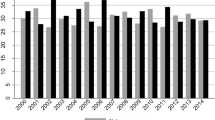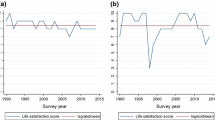Abstract
This paper partly revises the dynamic equilibrium (DE) theory of subjective well-being (SWB), sometimes termed set point theory. Results from four national panel surveys show that correlations among measures of SWB diminish over time, and that the SWB set points of a minority of individuals substantially change. These results mean that DE theory requires revision to make it more dynamic and enable it to better account for medium term change in SWB. The paper identifies personality traits and life events associated with subsequent changes in SWB. Data come from German, British and Australian panel surveys in which SWB has been measured for between 9 and 20 years. Panel regression random and fixed effects models were used to analyse the data.
Similar content being viewed by others
References
Andrews F.M. and Withey S.B. (1976). Social Indicators of Well-Being. Plenum, New York
Argyle M. (1987). The Psychology of Happiness. Methuen, Oxford
Baltagi B.H. (1995). Econometric Analysis of Pond Data. John Wiley, New York
Becker G. (1975). Human Capital: A Theoretical and Empirical Analysis, with Special Reference to Education. National Bureau of Educational Research, New York
Bradburn N.M. (1969). The Structure of Psychological Well-Being. Aldine, Chicago
Breusch T.S. and Pagan A.R. (1980). The Lagrange multiplier test and its applications to model specification in econometrics. Review of Economic Studies 12: 33–56
Brickman P.D. and Campbell D.T. (1971). Hedonic relativism and planning the good society. In: Appleby, M.H. (eds) Adaptation-Level Theory, pp 287–302. Academic Press, New York
Brickman P.D. and Coates D. (1978). Lottery winners and accident victims: Is happiness relative?. Journal of Personality and Social Psychology 36: 917–27
Cantor N. and Sanderson C.A. (1999). Life task participation and well-being: The importance of taking part in daily life. In: Kahneman, D., Diener, E. and Schwarz, N. (eds) Well-Being: The Foundations of Hedonic Psychology, pp 230–243. Russell Sage, New York
Clark A.E., Georgellis Y., Lucas R.E. and Diener E. (2004). Unemployment alters the set point for life satisfaction. Psychological Science 15: 8–13
Costa P.T. and McCrae R.R. (1980a). Influences of extraversion and neuroticism on subjective well-being. Journal of Personality and Social Psychology 38: 668–678
Costa P.T. and McCrae R.R. (1980b). Still stable after all these years: Personality as a key to some issues in adulthood and old age. In: Baltes, P.B. and Brim, O.G. (eds) Life Span Development and Behavior (Vol. 3), pp 65–82. Academic Press, New York
Costa P.T. and McCrae R.R. (1985). The NEO Personality Inventory. PAR, Odessa, Fla
Costa P.T. and McCrae R.R. (1991). NEO PI-R. PAR, Odessa, Fla
Costa P.T., McCrae R.R. and Zonderman A.B. (1987). Environmental and dispositional influences on well-being. Longitudinal follow-up of an American national sample. British Journal of Psychology 78: 299–306
Diener E., Suh E.M., Lucas R.E. and Smith H.L. (1999). Subjective well-being: Three decades of progress. Psychological Bulletin 25: 276–302
Diener, E. and R.E. Lucas: 1999, in D. Kahneman, E. Diener, N. Schwarz (eds.), Well-being: The Foundations of Hedonic Psychology (Russell Sage, New York), pp. 213–229
Diener E., Emmons R.A., Larsen R.J. and Griffen S. (1985). The satisfaction with life scale. Journal of Personality Assessment 49: 71–75
Easterlin R.A. (1974). Does economic growth improve the human lot? Some empirical evidence. In: David, P.A. and Reder, M.W. (eds) Nations and Households in Economic Growth, pp 89–125. Academic Press, New York
Emmons R.A. (1986). Personal strivings: An approach to personality and subjective well-being. Journal of Personality and Social Psychology 51: 1058–1068
Eysenck H.J. and Eysenck S.B.G. (1964). Personality Structure and Measurement. Routledge & Kegan Paul, London
Frederick, S. and G. Loewenstein: 1999, in D. Kahneman, E. Diener and N. Schwarz (eds.), Well-Being: The Foundations of Hedonic Psychology (Russell Sage, New York), pp. 302–329
Frijters P., Haisken-Denew J.P. and Shields M.A. (2004). Money does matter! Evidence from increasing real incomes and life satisfaction in East Germany following reunification. American Economic Review 94: 730–741
Fujita F. (2005). Life satisfaction set-point: Stability and change. Journal of Personality and Social Psycholgy 88: 158–164
Gerlitz, J.-Y. and J. Schupp: 2005, ‘Zur Erhebung der Big-Five-basierten Persoenlichkeitsmerkmale im SOEP’, www.diw.de/deutsche/produkte/publikationen/researchnotes/docs/papers/rn4.pdf
Goldberg D. (1978). Manual of the General Health Questionnaire. NFER, Windsor
Hausman J.A. (1978). Specification tests in econometrics. Econometrica 46: 1251–1271
Headey B.W. and Wearing A.J. (1989). Personality, life events and subjective well-being: Toward a dynamic equilibrium model. Journal of Personality and Social Psychology 57: 731–739
Headey B.W., Kelley J. and Wearing A.J. (1993). Dimensions of mental health: life satisfaction, positive affect, anxiety and depression. Social Indicators Research 29: 29–63
Headey B.W. and Wearing A.J. (1992). Understanding Happiness: A Theory of Subjective Well-being. Longman Cheshire, Melbourne
Helson H. (1964). Adaptation-Level Theory. Harper & Row, New York
Henderson S., Byrnes D.G. and Duncan-Jones P. (1981). Neurosis and the Social Environment. Academic Press, New York
Holmes T.H. and Rahe R.H. (1967). The social readjustment rating scale. Journal of Psychosomatic Research 11: 389–395
Kahneman D. (1999). Objective happiness. In: Kahneman, D., Diener, E. and Schwarz, N. (eds) Well-Being: The Foundations of Hedonic Psychology, pp 3–25. Russell Sage, New York
Krause P. (2003). Income, poverty and dynamics in Germany. In: Krause, P., Baecker, G. and Haensch, W. (eds) Combating Poverty in Europe, pp 93–116. Ashgate, Aldershot
Larsen R.J. (1992). Neuroticism and selective encoding and recall of symptoms: Evidence from a combined concurrent-retrospective study. Journal of Personality and Social Psychology 62: 489–498
Larsen R.J. and Ketelaar T. (1991). Personality and susceptibility to positive and negative emotional states. Journal of Personality and Social Psychology 61: 132–140
Larsen R.J. and Diener E. (1985). An evaluation of subjective well-being measures. Social Indicators Research 17: 1–18
Lillard L.A. and Willis R.J. (1978). Dynamic aspects of earnings mobility. Econometrica 46: 985–1012
Lucas R.E., Clark A.B., Georgellis Y. and Diener E. (2003). Reexamining adaptation and the set point model of happiness: Reactions to change in marital status. Journal of Personality and Social Psychology 84: 527–539
Lucas R.E. and Baird B.M. (2004). Extraversion and emotional reactivity. Journal of Personality and Social Psychology 86: 473–485
Lykken D. and Tellegen A. (1996). Happiness is a stochastic phenomenon. Psychological Science 7: 186–189
Lykken D. (1999). Happiness: What Studies on Twins Show Us about Nature, Nurture and The Happiness Set Point. Golden Books, New York
Maddi S.R., Bartone P.T. and Puccetti M.C. (1987). Stressful events are indeed a factor in physical illness: Reply to Schroeder and Costa (1984). Journal of Personality and Social Psychololgy 52: 833–843
Magnus K., Diener E., Fujita F. and Pavot W. (1993). Extraversion and neuroticism as predictors of objective life events: A longitudinal analysis. Journal of Personality and Social Psychology 65: 1046–1053
Michalos A.C. (1985). Multiple discrepancies theory (MDT). Social Indicators Research 16: 347–413
Parducci A. (1995). Happiness, Pleasure and Judgment: The Contextual Theory and its Applications. Erlbaum, Hove, England
Peterson C. (1999). Personal control and well-being. In: Kahneman, D., Diener, E. and Schwarz, N. (eds) Well-Being: The Foundations of Hedonic Psychology, pp 288–301. Russell Sage, New York
Rahe R.H. and Arthur R.H. (1978). Life change and illness studies. Journal of Human Stress 4: 3–15
Rowlison R.T. and Feiner R.D. (1988). Major life events, hassles and adaptation in adolescence: Confounding in the conceptualization and measurement of life stress and adjustment revisited. Journal of Personality and Social Psychology 55: 853–863
Rusting C.L. and Larsen R.J. (1997). Extraversion, neuroticism and susceptibility to positive and negative affect. Personality and Individual Differences 22: 607–612
Schroeder D.H. and Costa P.T (1984). Influence of life event stress on physical illness: Substantive effects or methodological flaws?. Journal of Personality and Social Psychology 46: 853–863
Schwarz N. and Strack F. (1999). Reports of subjective well-being: Judgmental processes and their methodological implications. In: Kahneman, D., Diener, E. and Schwarz, N (eds) Well-Being: The Foundations of Hedonic Psychology, pp 61–84. Russell Sage, New York
Suh E.N., Diener E. and Fujita F. (1996). Events and subjective well-being: Only recent events matter. Journal of Personality and Social Psychology 70: 1091–1102
Veenhoven, R.: 1994, ‘Correlates of Happiness; 7836 Findings from 603 Studies in 69 Nations: 1911–1994’ (Unpublished manuscript, Erasmus University Rotterdam, The Netherlands)
Watson D., Clark L.A. and Tellegen A. (1988). Development and validation of brief measures of positive and negative affect: The PANAS scales. Journal of Personality and Social Psychology 54: 1063–1070
Wengle H. (1986). The psychology of cosmetic surgery: A critical overview of the literature 1960–1982. Part 1. Annals of Plastic Surgery 16: 435–443
Wilson W. (1967). Correlates of avowed happiness. Psychological Bulletin 67: 294–306
Wortman C.B. and Silver R.C. (1987). Coping with irrevocable loss. In: Vanderbos, G.R. and Bryant, B.K. (eds) Cataclysms, Crises, Catastrophes: Psychology in Action, pp. APA, Washington, DC
Author information
Authors and Affiliations
Rights and permissions
About this article
Cite this article
Headey, B. Subjective Well-Being: Revisions to Dynamic Equilibrium Theory using National Panel Data and Panel Regression Methods. Soc Indic Res 79, 369–403 (2006). https://doi.org/10.1007/s11205-005-5381-2
Accepted:
Published:
Issue Date:
DOI: https://doi.org/10.1007/s11205-005-5381-2




